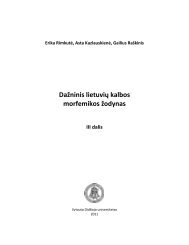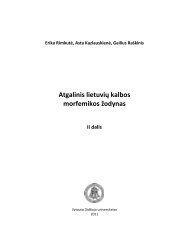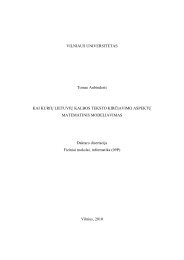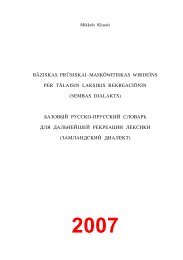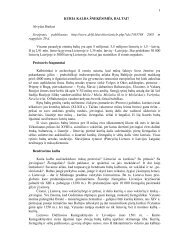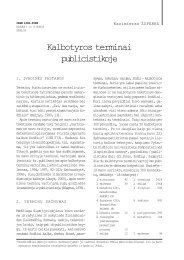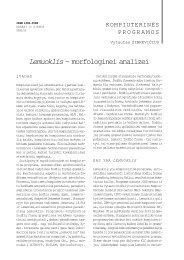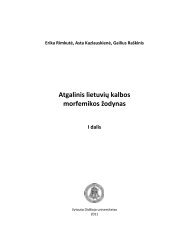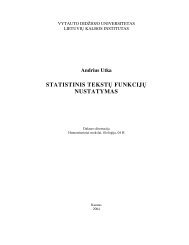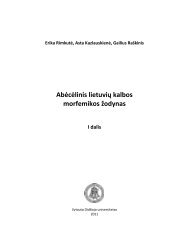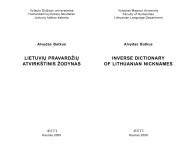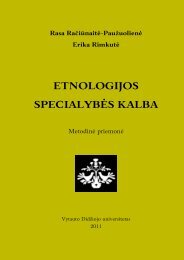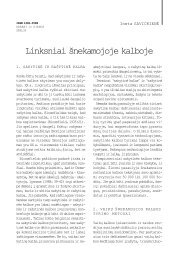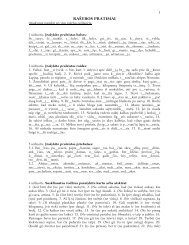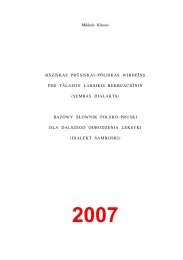HISTORICAL GRAMMAR OF OLD PRUSSIAN
HISTORICAL GRAMMAR OF OLD PRUSSIAN
HISTORICAL GRAMMAR OF OLD PRUSSIAN
You also want an ePaper? Increase the reach of your titles
YUMPU automatically turns print PDFs into web optimized ePapers that Google loves.
<strong>HISTORICAL</strong> <strong>GRAMMAR</strong> <strong>OF</strong> <strong>OLD</strong> <strong>PRUSSIAN</strong><br />
stem acc. sg. soûnan ‘son’ beside older u-stem acc. sg. sunun ‘idem’ because<br />
of the nom. sg. (soûn)-s (an u-stem form in Pr. Cat. -s < Pr. *-us, cf.<br />
* 134) = (deiw)-s (an a-stem form) 32 .<br />
* 88. In the same way were produced innovative a-stem forms of<br />
a numeral Pr. (Cat.) card. acc. sg. *-an (desimton III 27 ‘ten’ used as a<br />
1<br />
nominative), acc. pl. *-ans (dessimtons III 67 ). These forms originate in<br />
3<br />
i-stem nr. (subst.) nom. sg. *desimts ‘(a) ten’ (Pr. Cat. *-is > *-s) under the<br />
influence of a-stem Pr. Cat. ord. nom. sg. *desimts (< *desimtas) ‘tenth’.<br />
Finally, Pr. (III) card. acc. pl. tûsimtons ‘thousands’ = *tûsimtans<br />
should be treated as an innovative a-stem instead of original i-stem, Pr.<br />
(Cat.) nom. *tûsimts ‘thousand’ < *tûsimtis (cf. Lith. t«kstantis ‘idem’).<br />
Cf. also * 156.<br />
a-stems<br />
* 89. Nom. sg. masc. Balt. *-as (< IE *-os) produced an inflection<br />
Pr. *-as, which turned either into Pr. (E) -s, e.g.: awins ‘ram’, slayx<br />
‘worm’ etc., or (most frequently) into *- i s (< *-as), e.g.: Deywis ‘God’,<br />
Finally, 2 i-stem occurences among all 3 occurences of accusative singular even do not<br />
suffice to reconstruct i-stem at all (in spite of its possibility) when confronted to 7 instances of<br />
nom. sg. masc. (!) qu`its (or quaits) in the Catechisms. An a-stem form (masc. *kv`itas) seems<br />
to be no less regular than an i-stem form (masc. or fem. *kwaitis) – cf. Lith. a-stem nom. sg. masc.<br />
dial. ka…ndas vs. i-stem fem. kandÑs. Pr. nom. sg. qu`its being undoubtedly masculine (twais<br />
qu`its), an assumption of the i-stem should contradict to regular feminine occurences of i-stem<br />
abstracts in Lithuanian. Therefore the opinion of PEÞ II 324 still seems to be more plausible: the<br />
spelling qu`itan corresponded to living spoken Prussian. – L.P.<br />
32 This short survey does not embrace all instances when acc. sg. -in occurs instead of a-stem -an<br />
in the Catechisms. The i-stem declensional model hardly could influence even foreign translators<br />
to substitute with it much more frequent a-stem forms. One should take into consideration<br />
more frequent Ùa-stem forms (strongly mixed with i-stem forms) as well as a doubtful difference<br />
between Ùa-, i- and e-stem accusatives [uniformly spelled as -ian(s) / -ien(s) / -in(s)] in the Catechisms.<br />
A hard-stem accusative (-an, -un) was opposed to a palatal-stem accusative in which<br />
older inflections were neutralized and became allomorphs in Samlandian dialects of the Catechisms<br />
(cf. ftn. 54). Since a resonant *l seems to have been palatal in these dialects [cf. an astem<br />
nom. pl. masc. kaulei (III) = *kaul’ai



